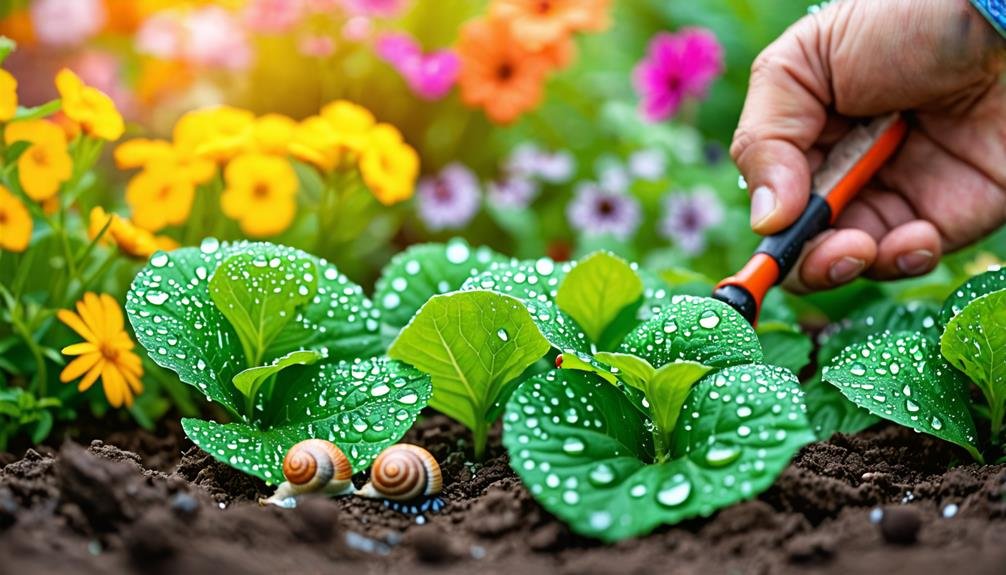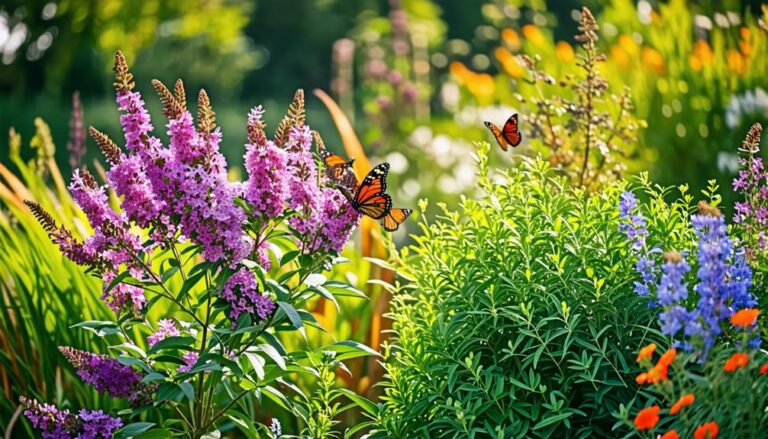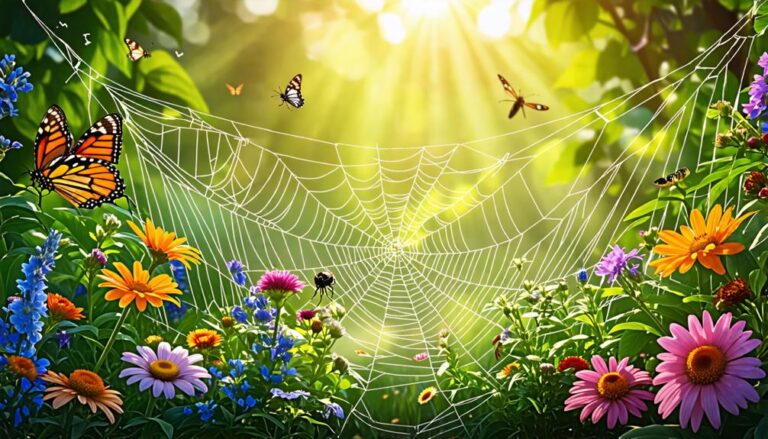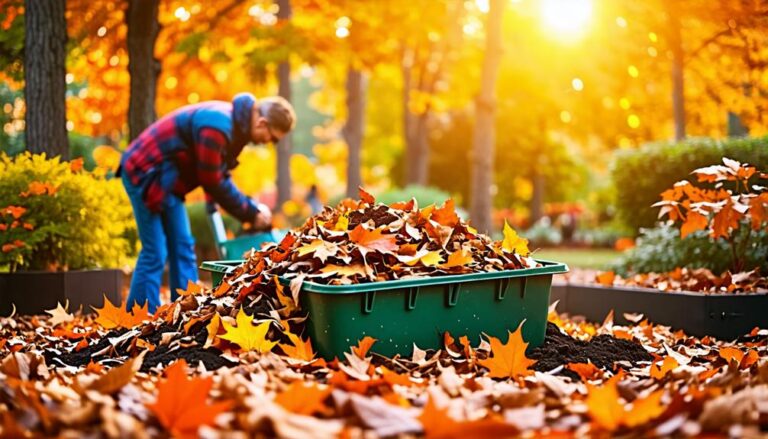After heavy rain, snails and slugs often invade gardens in search of soft plants. To remove them, start by hand-picking visible snails and slugs during dry periods. Create beer traps by placing shallow containers filled with beer in your garden, which will attract and drown them. Sprinkle diatomaceous earth or crushed eggshells around plants to create barriers. Plant natural deterrents, such as garlic and sage, which these pests dislike. Regularly check your garden for any infestation and maintain a clean environment to discourage their return. There's much more to discover about effective gardening strategies and pest management.
Understanding Snail and Slug Behavior
Understanding the behavior of gastropods, specifically snails and slugs, is crucial for effective garden management. Their nocturnal feeding habits and preference for humid environments significantly influence plant health. These mollusks are most active at night, searching for lush, damp foliage. This behavior makes them particularly attracted to gardens after rain events or irrigation, where they can thrive and reproduce.
Gastropods typically consume soft, tender vegetation, posing a threat to delicate flowers and edible crops. They leave a slimy trail, which some gardeners might view as simple messiness. However, this trail serves a purpose; it aids in navigation and can deter certain predators.
Recognizing these behaviors enables gardeners to anticipate potential infestations and implement preventive strategies. For example, understanding their preference for moist areas can inform irrigation practices, as excessive watering may attract these pests. Additionally, awareness of their nocturnal activity can encourage timely interventions, like nighttime inspections. By learning about snails and slugs and their behaviors, gardeners can employ strategies that enhance plant health while enjoying their outdoor spaces.
Effective Plant Choices
Which flora can effectively deter gastropods while enhancing garden aesthetics and health? Choosing the right plant selections is essential in managing these garden pests. For effective pest control, consider cultivating aromatic herbs such as Salvia officinalis (sage) and Rosmarinus officinalis (rosemary). Their strong fragrances can repel slugs, while offering culinary advantages. Additionally, Allium sativum (garlic) and Allium schoenoprasum (chives) are excellent options, as their aroma is unappealing to these critters.
Incorporating plants with spiny or coarse foliage can serve as a natural barrier. For example, thorny Rosa species (roses) or rough-leaved plants can deter slugs and snails from venturing too close. Another strategy is to plant Tagetes (marigolds), whose vibrant blooms not only beautify your garden but can also distract pests from more vulnerable flora.
Furthermore, utilizing natural materials like ground eggshells or seashells around your plants creates an unpleasant texture that gastropods avoid. These simple yet effective plant choices can greatly reduce the presence of these garden pests while maintaining an inviting and thriving garden environment. By carefully selecting plants, you can foster a healthier ecosystem that flourishes free from unwanted visitors.
Natural Deterrents
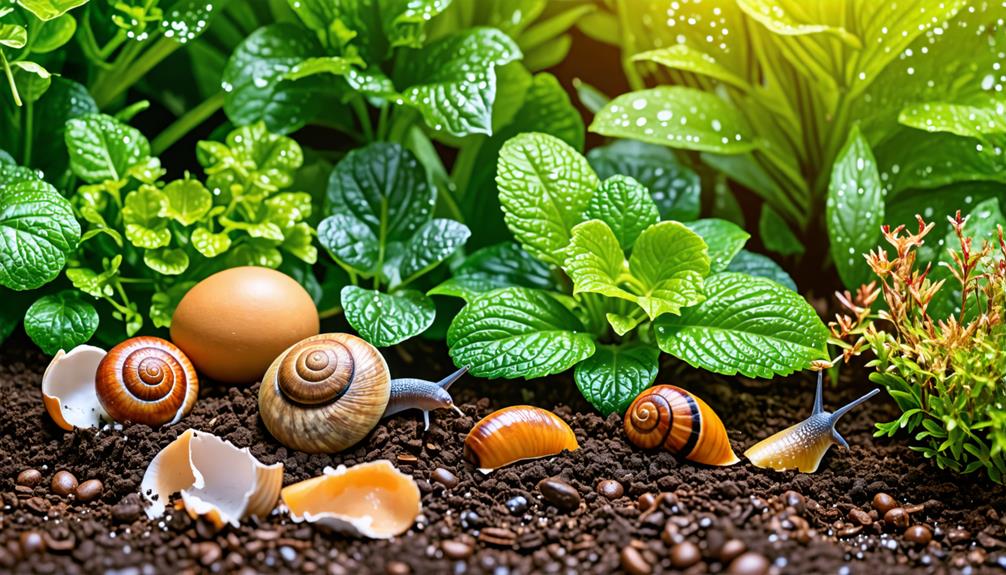
To effectively deter snails and slugs from invading your garden, consider incorporating unattractive plant choices and abrasive natural barriers. Plants like sage, rosemary, garlic, and chives can create an unwelcoming environment for these pests, while materials such as diatomaceous earth and crushed eggshells provide a rough texture that discourages their movement. By utilizing these natural deterrents, you can protect your garden while fostering a healthy ecosystem without relying on harmful chemicals.
Unattractive Plant Choices
Incorporating less appealing herbs such as sage and rosemary into your backyard can act as a natural barrier against snails and slugs. These fragrant plants emit strong odors that deter these pests, minimizing their presence after significant rainfall. By choosing these specific herbs, you can cultivate a more robust garden while enhancing its overall allure.
Garlic and chives also serve as excellent options for repelling snails and slugs. Their intense scents are uninviting to these creatures, making it less probable for them to invade your outdoor space. When maintaining a rain garden, it is essential to select flora that flourishes in moist environments yet remains unattractive to pests.
Planting these culinary herbs and vegetables not only aids in keeping snails and slugs at bay but also enriches the soil and offers culinary uses. As you nurture a varied garden with these uninviting plants, you create a setting that promotes healthy growth while naturally warding off unwanted visitors. Ultimately, these plant selections empower you to sustain a thriving garden, free from the disturbances of snails and slugs, even following heavy downpours.
Abrasive Natural Barriers
Abrasive natural barriers, such as Diatomaceous Earth and Eggshell Powder, effectively deter snails and slugs from invading gardens by creating unpleasant textures that disrupt their movement. These materials serve as physical barriers, hindering these pests as they crawl over them. For instance, Diatomaceous Earth, composed of tiny, sharp particles, can damage the soft bodies of these mollusks, making it a formidable defense.
To implement this strategy, sprinkle a generous layer of Diatomaceous Earth around your plants or use ground eggshells, which also serve as a barrier. Both options are eco-friendly and can be easily replenished after rainfall. Additionally, placing seashells around your garden can create a similar effect, as their rough surfaces deter these unwelcome visitors.
Creating Beer Traps
Creating effective beer traps can be a simple yet efficient method for managing snails in your garden. By placing shallow containers filled with beer or a mixture of yeast, sugar, and water around your plants, you can attract these pests and minimize their impact on your garden. Once the snails gather for a drink, it's crucial to dispose of them properly, ensuring a healthier environment for your plants.
Effective Beer Trap Setup
A beer trap is an effective method to attract and eliminate garden pests like snails and slugs. To set up this trap, select shallow containers, such as small bowls or cut plastic bottles. Fill these containers with your preferred beer, ensuring they are about halfway full. The aroma of the beer will lure snails and slugs, enticing them to take a sip.
Position the traps strategically throughout your garden, particularly in areas with noticeable pest activity. It's best to place them during the evening, as these nocturnal pests will be more active at night. You can enhance the beer's appeal by adding a bit of sugar or yeast.
Regularly check your traps, and dispose of any snails or slugs that have come for a drink. While this method is effective, maintaining a clean garden environment is essential. By using beer traps, you create a non-toxic solution that respects the balance of your garden's ecosystem while protecting your plants from these unwanted visitors.
Alternative Trap Solutions
Exploring alternative trap solutions can enhance your efforts in managing snail and slug populations in your garden. One effective method is creating beer traps, which attract these pests with their scent. To set up a beer trap, fill shallow containers with a popular brand of beer, like Budweiser or Heineken, and bury them in the ground so that the rim is level with the soil. The snails and slugs will be lured in, unable to escape once they fall in.
If you prefer a DIY approach, consider combining yeast, sugar, and water as an alternative bait. This mixture can be just as enticing for snails and slugs, providing an additional option to keep your garden protected. It's crucial to check these traps regularly and dispose of any trapped pests promptly to maintain effective control.
Snail Disposal Methods
To effectively manage snail populations, proper disposal methods for snails captured in beer traps are essential. Beer traps, utilizing the attraction of yeast and sugar found in brands like Budweiser or Heineken, serve as an efficient means to lure snails. To create a beer trap, fill a shallow container with your chosen beer and bury it in the garden, leaving the rim slightly above soil level. This design ensures easy access for snails while keeping the trap concealed from birds and other animals.
Once snails congregate for a drink, they will fall into the container and drown. After a day or two, check the traps and dispose of the snails. You can either bury them in your compost heap or toss them far away from your garden, allowing nature to take its course. Alternatively, if beer is not available, create a mixture of yeast, sugar, and water to attract snails.
Using beer traps not only helps control the snail population but also supports a healthier garden ecosystem. By employing these methods, you can cultivate a thriving garden while enjoying and nurturing your plants.
Utilizing Snail Refuges
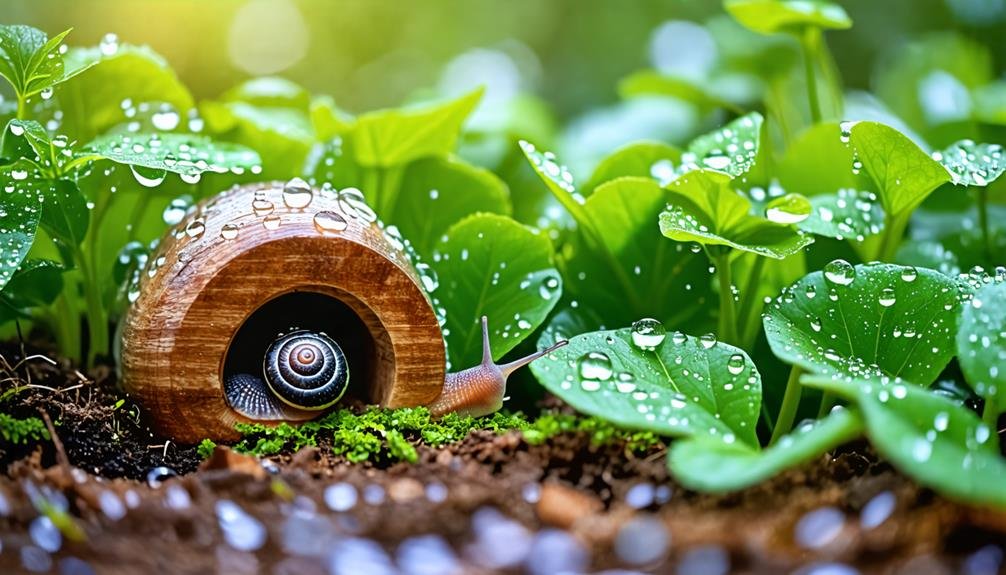
Citrus peels act as effective shelters for gastropods, giving them a safe haven while enabling horticulturists to manage their populations more effectively. By distributing these peels across your garden, you create attractive hiding spots for snails. They instinctively seek out moist, shaded spaces, and the peels provide an ideal environment for them to rest and feel protected.
As you inspect these shelters, you can observe snail activity and remove them as necessary. This practice not only aids in controlling their numbers but also reduces harm to your flora. Remember to periodically dispose of the peels, ensuring that you also gather any snails that may be utilizing this refuge.
Additionally, consider planting Tagetes along the edges of your flower beds. These colorful blooms not only enhance the aesthetics of your garden but also draw snails, steering them away from more susceptible plants. By concentrating their attention on Tagetes, you can effectively eliminate them and encourage healthier plant development. Implementing these straightforward strategies will empower you to reclaim your garden from snails and slugs, nurturing a flourishing, vibrant environment that showcases your gardening endeavors.
Hand-Picking Techniques
How can hand-picking effectively reduce the populations of gastropods in your garden? This straightforward yet proactive approach enables you to directly target these pests without relying on pesticides. Begin your search in the early morning or late evening, as these nocturnal mollusks are more active during the cooler parts of the day.
Equipped with gloves, carefully inspect your flora, focusing on foliage, stems, and the soil surface. Look for the slimy trails they leave behind or the glistening bodies of snails and slugs. When you locate them, simply pick them up and place them in a container filled with dish soap and water, which will humanely eliminate them.
To enhance your efforts, consider establishing a routine. Regular hand-picking can significantly decrease their numbers and safeguard your plants. You might also find it beneficial to utilize a flashlight at night, illuminating their hidden locations.
Though this technique requires patience and diligence, the freedom it provides in maintaining a thriving garden is invaluable. By directly addressing the issue, you can cultivate a flourishing space free from these unwanted garden invaders.
Preventive Measures
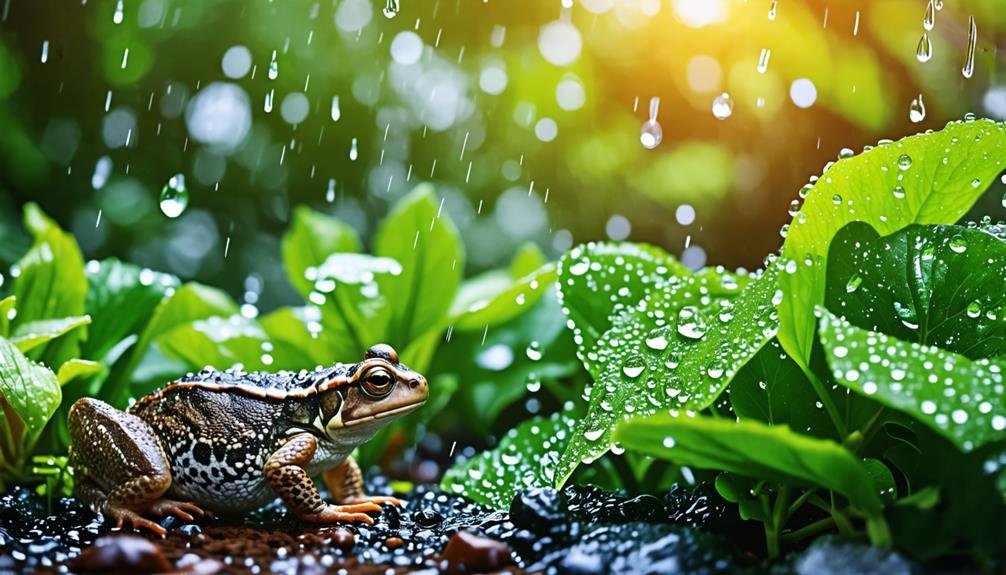
To effectively prevent snails and slugs from invading your garden, strategic planning is crucial. By planting deterrents such as sage and garlic, utilizing natural barriers like diatomaceous earth, and monitoring moisture levels to keep them in check, you can create an unwelcoming environment for these pests. Implementing these preventive measures will not only protect your plants but also foster a healthier garden ecosystem.
Plant Deterents Strategically
Incorporating specific plants known to deter gastropods can enhance the resilience of your garden against these pests. By selecting certain herbs and flowering plants, you can create a natural barrier that minimizes the impact of these garden invaders. For instance, planting Salvia (sage) and Rosmarinus (rosemary) not only adds aesthetic appeal but also releases scents that repel snails and slugs.
Additionally, Allium sativum (garlic) and Allium schoenoprasum (chives) are excellent choices due to their strong odors, which these pests tend to avoid. Consider integrating plants with coarse or spiky foliage, as their textures make them less appealing to gastropods.
Another effective measure is to scatter ground eggshells or crushed seashells around your flora. These create a rough surface that snails find uncomfortable to traverse. By choosing the right plants and materials, you can significantly reduce the likelihood of snail infestations.
Embracing these natural deterrents allows you to maintain a flourishing garden while minimizing the need for harsh pesticides. Remember, a diverse garden not only enriches your space but also fosters a balanced ecosystem, ultimately promoting freedom for your plants to thrive.
Utilize Natural Barriers
Using natural barriers effectively prevents snails and slugs from invading your garden. These physical obstructions disrupt their movement and feeding habits. One popular method involves creating a barrier around your garden with coarse materials like diatomaceous earth or crushed eggshells. These substances deter pests due to their abrasive texture and create a challenging barrier for snails.
Another strategy includes positioning plants with spiny or coarse foliage near delicate species. For example, rosemary or sage can protect more vulnerable plants, as snails prefer smoother surfaces for travel. Additionally, placing seashells or sharp stones around the base of your plants adds formidable obstacles for these slimy intruders.
Monitor Moisture Levels
Monitoring soil moisture in your garden is crucial for controlling the spread of slugs and snails, as these pests flourish in wet conditions. By managing moisture effectively, you can create an environment that is less inviting for these nuisances. Here are some practical measures to maintain optimal moisture levels:
- Irrigate Smartly: Water your plants in the early morning. This allows the soil to dry out by nightfall, making it less appealing to slugs and snails that prefer cool, moist evenings.
- Enhance Drainage: Ensure that your garden beds, like those from Gardener's Supply Company, have sufficient drainage. Utilizing raised beds or incorporating organic materials can facilitate excess water flow, thereby reducing humidity.
- Use Mulch Sparingly: Apply mulch carefully, as it can trap moisture. Opt for drier substances, such as straw or wood chips from Home Depot, to limit moisture retention.
- Monitor Soil Moisture: Utilize a soil moisture meter from brands like Ecowitt to regularly assess moisture levels. Adjust your irrigation methods based on the readings to keep moisture in balance.
Using Diatomaceous Earth
Diatomaceous earth acts as an effective and natural barrier against garden pests like snails and slugs, using its coarse texture to repel these unwanted visitors. This fine powder, derived from the fossilized remains of microscopic aquatic organisms, inflicts damage on the delicate, moist bodies of these creatures when they attempt to traverse it. When spread around your plants, diatomaceous earth creates a protective ring that blocks snails and slugs from accessing your cherished foliage.
To maximize the benefits of diatomaceous earth, apply a light, uniform layer around the base of your plants. It's essential to refresh the application after significant rainfall or watering, as moisture diminishes its efficacy. This method not only provides a physical barrier but also allows you to care for your garden without relying on harmful chemicals.
While employing this natural deterrent, remember that diatomaceous earth is non-toxic to pets and wildlife, giving you peace of mind while protecting your plants. By opting for this strategy, you take charge of cultivating a thriving garden ecosystem, free from the destructive effects of snails and slugs, promoting both plant vitality and your enjoyment of gardening.
Maintaining Garden Hygiene

Maintaining a tidy garden is essential for preventing infestations of gastropods like snails and slugs, as a neat environment minimizes their hiding spots and breeding grounds. By implementing these straightforward methods, you can create a less appealing habitat for these pests, ensuring your garden remains flourishing and vibrant.
- Regularly remove organic waste: Clear away fallen foliage, branches, and other plant debris that can provide shelter for gastropods. This simple task can significantly reduce their numbers.
- Water strategically: Irrigate your garden during the early morning hours, allowing the soil to dry out throughout the day. This lowers moisture levels, making the environment less inviting for snails and slugs.
- Inspect plants regularly: Frequently examine your flora for any signs of gastropods. Early detection allows for prompt removal, preventing further damage to your plants.
- Establish barriers: Utilize copper tape, crushed eggshells, or diatomaceous earth around the bases of your plants to repel snails and slugs. These materials create uncomfortable surfaces, prompting slugs to find refuge elsewhere.
Monitoring and Adjusting Strategies
Regular assessment of pest control effectiveness is vital for adjusting strategies to keep garden snails and slugs away. By observing your garden's state, you can determine which methods succeed and which require modification. For example, if your beer traps fail to attract snails, consider relocating them or trying a different bait, such as a yeast and sugar blend.
Additionally, evaluate the repellent plants in your garden. If sage and rosemary do not deter these pests effectively, you might introduce more coarse-leaved plants or expand the area treated with diatomaceous earth, a natural pest control product.
Also, review how often you check for pests. Since snails are primarily active at night, inspect your garden during evening hours or early mornings to catch them in action. Take note of any patterns in their behavior, as this can guide your future pest control efforts. Adapting your techniques empowers you to maintain a flourishing garden free from these uninvited guests. Stay vigilant and proactive, and your dedication will result in a thriving outdoor space.

